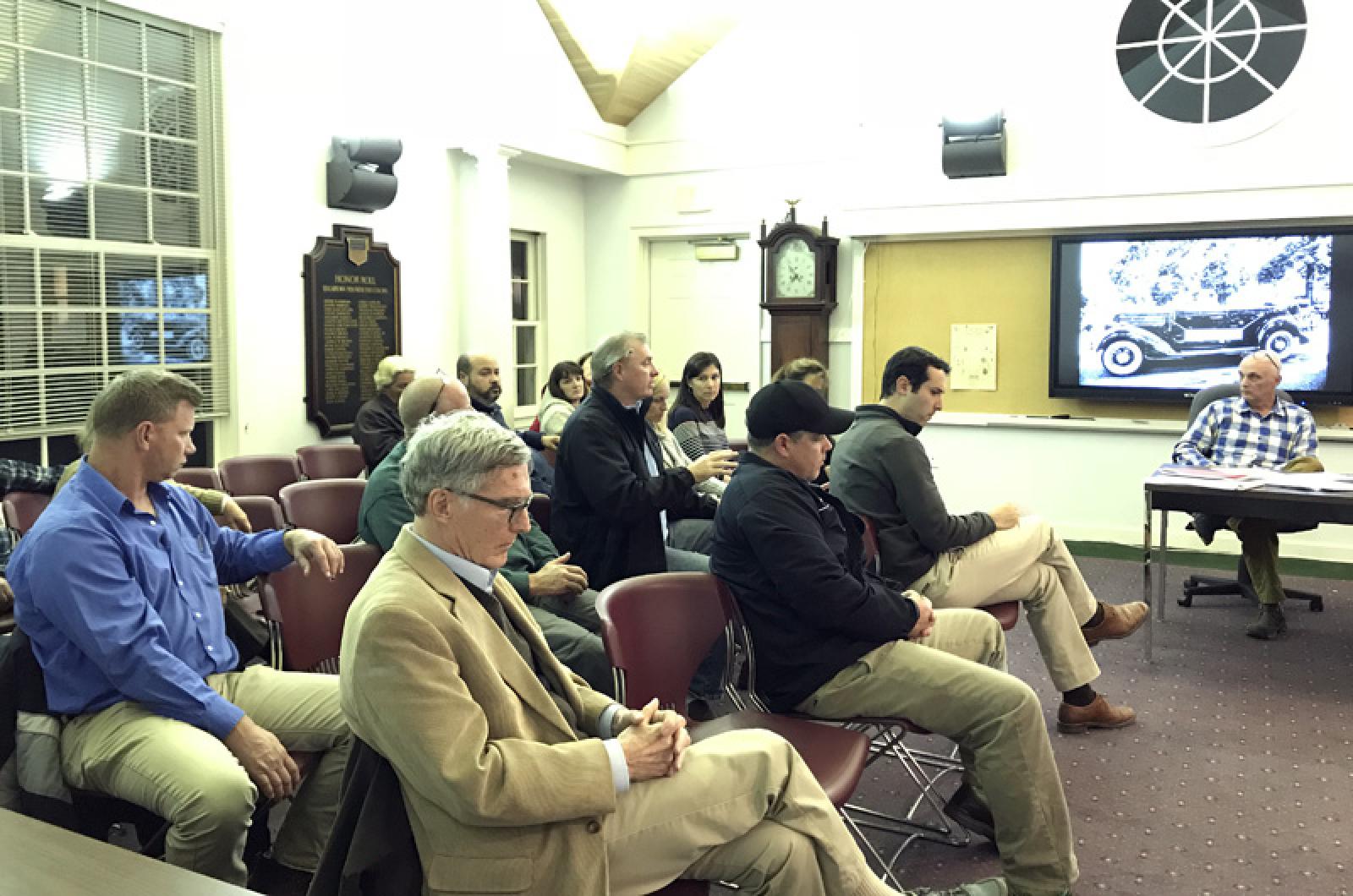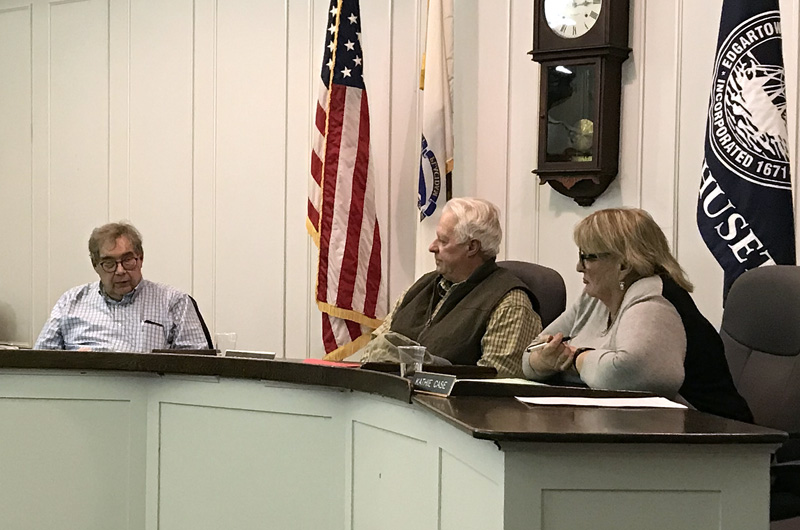The Edgartown board of health’s decision to pursue adding fluoride to the town water supply has sparked outrage among some town residents and officials, who called this week for the board to rescind its vote.
A petition initiative has begun to place the issue on an election ballot. The board of health and water department will discuss fluoride at a joint meeting next week.
The board of health voted 2-0 at a meeting Oct. 10 to add fluoride to town water, according to health agent Matt Poole. Board members Harold Zadeh and Dr. Garrett Orazem voted in favor; Kathie N. Case abstained.
The board’s vote followed state law that gives local boards of health power to order the upward adjustment of fluoride content in town water if the board finds it is in the best interest of the town. Under state law the order does not go into effect until 90 days after notice is published in a newspaper. Notice was printed in the Gazette on Oct. 20.
During that 90-day period, residents can file a petition signed by 10 per cent of town residents, or 363 people in Edgartown, to bring the matter before voters at the next town election.
According to government statistics about 75 per cent of the U.S. population receives fluoridated water through public water systems, including 140 Massachusetts communities. Oak Bluffs is the only Island town to add fluoride to the water supply, and has been doing so since 1991.
Two years ago Oak Bluffs residents weighed in on fluoridation in a non-binding referendum at the town election. The town ended up voting to continue fluoride use, with 281 in favor of ceasing fluoride and 646 opposed.
Edgartown board of health members stood by their decision at their meeting Tuesday, which was attended by about 15 people, including water commissioners and a town selectman. Discussion largely focused on process.
Mr. Poole said the board shared a common goal with members of the community: bringing the issue to a town vote. He said the clearest path forward would be for the board to support the petition initiative, which would set up a binding vote next spring.
“The value in doing that is it ultimately gives the voters the opportunity to weigh in, to be counted, and to voice their opinion,” he said. A variety of other complicated options would draw the process out, he said, which the board did not want to do.
Those attending the meeting spoke strongly against the board moving forward with their vote, citing concerns about the success of the petition initiative and a process that they said did not give townspeople proper notice or an opportunity to weigh in.
Selectman and board chairman Arthur Smadbeck asked the board to rescind the vote. “About a week ago it was brought to my attention that the board had set in motion something that would impose the town, with no input from the town, something quite large — fluoridating the water of the townspeople with no input from the townspeople,” he said. He said it would be difficult to gather 400 signatures in a short time.
“This imposition on the town with no public hearings, no input from the townspeople is wrong,” he said.
As a compromise, he suggested that the board should agree to rescind their vote if the petition effort is not successful.
Members of the board said they were concerned that would take away the incentive for those against fluoride to pursue the petition initiative.
Water commissioner James E. Kelleher said the water department should have been involved. “You guys have not discussed any of the cost associated with this,” he said. “It just came out of nowhere. That’s what’s upsetting. I just think the whole thing is flawed.
Others said members of the town had less than 90 days to gather signatures because people were not immediately aware of the board’s action.
“Allow us to learn more about this research and not have to scramble for signatures,” said Paulo DeOliveira. He suggested a nonbinding vote in the spring that would indicate whether the town wants to move forward.
Water commissioner David Burke, who said he helped put the petition together, questioned who the board was trying to help through fluoridating water. Water department superintendent William Chapman also called on the board to rescind, saying he felt the state law wasn’t properly followed.
During the discussion some shouted calls to rescind the vote.
“We want to assure people get their say,” Mr. Smadbeck said. “This has to be undone.”
Board members said they followed the law and pointed out that notice was published in the paper. They said they welcomed a chance to have the town weigh in, but said they did not want to undo their vote.
“I think the petition is the proper thing to do,” said Dr. Orazem. “That’s what we took into consideration when we took the vote.” He said he felt 90 days was an adequate amount of time to gather petition signatures.
Some questioned whether there was an urgent health matter. “Is there a reason to rush this?” Debra Gaines asked. Others pointed out the community dentistry program Vineyard Smiles.
Dr. Orazem, a longtime dentist on the Island, said the benefits of adding fluoride to community water have been well established over the past 70 years. He said there is concern in the Island dental community that tooth decay is worse than it should be, especially among children.
“To serve on the board of health, one of the things you can do with community water fluoride is bring the benefits of fluoride to everyone in town, not just the people that are organized enough to go to their dentist and get some fluoride for their family, not just for people who can get routine dental care,” Dr. Orazem said. “Everyone in town benefits.”
Mr. Zadeh, the board chairman, said he was originally against the fluoride proposal but changed his mind after doing research.
“I felt at first that this was going to happen all of a sudden and I was against it,” Mr. Zadeh said. “Then I took the time to educate myself and saw the benefits.”
He defended the process, saying it is the board’s job to make health decisions for the town. “It’s not behind your backs,” Mr. Zadeh said. “It’s because we’ve been elected to do this for the town. You’ve let us know you don’t like it, okay we get that. Let’s move forward with what works for us.”
The board agreed to talk with town counsel about whether there was a way to add a binding referendum to the ballot without a board of health vote. The board will meet next Tuesday with the water commission to further discuss the issue.






Comments (15)
Comments
Comment policy »